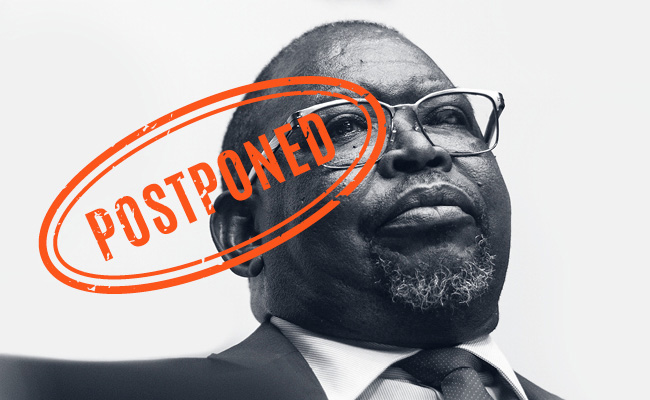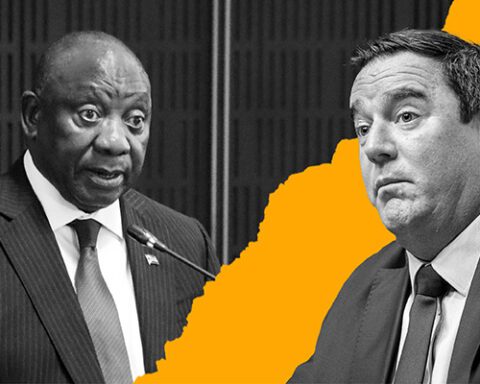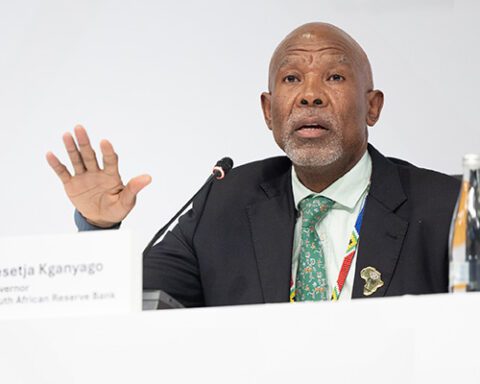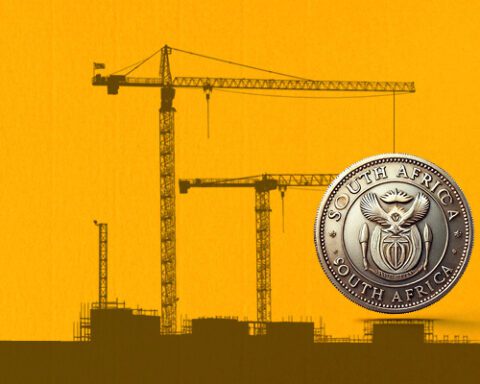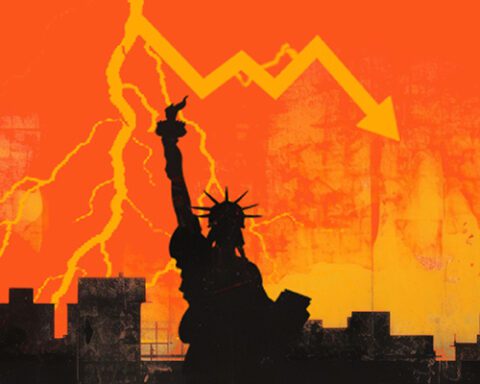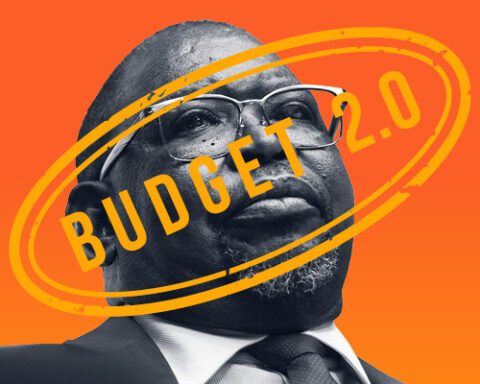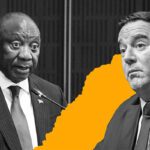It’s tempting to wonder why the DA’s deputy finance minister Ashor Sarupen was late to Wednesday morning’s budget briefing to the press, ahead of what would have been Enoch Godongwana’s first budget presentation under the new grand coalition government.
The tax proposals, critically, had apparently not been agreed by the parties in that new government. Which meant that the likelihood of the budget being passed by parliament later were vanishingly slim.
Sarupen, in fact, said nothing at all during that morning press conference, which, as in previous years, was its typically smooth and professional affair. At no stage was there any hint of the fracas that would erupt in parliament four hours later.
At 2pm, as has been convention in every budget speech since democracy 31 years ago, all the political parties, the media and dignitaries gathered to hear the finance minister rattle through the usual: sin tax increases, chastening words on civil servants’ wages (conveniently soon forgotten), and promises of abundant GDP growth in future.
Only this time, it didn’t happen. Parliament’s speaker, Thoko Didiza, abruptly cancelled Godongwana’s address, after the leader of government business, Deputy President Paul Mashatile, said that coalition partners had not been able to agree on the budget.
The central bone of contention was a proposed two percentage point increase in VAT, to 17%.
The writing was on the wall when Godongwana’s address hadn’t begun by 2pm. A cabinet meeting held just before his speech had run over, as the ministers objected heatedly to Godongwana’s VAT hike.
Khumbudzo Ntshavheni, the minister in the presidency, told a media briefing afterwards that it wasn’t just the DA that had rejected the proposal. “That is completely wrong – the differences were across parties including ministers you’d call ANC ministers. So it was not a one party issue.”
This ran counter to the narrative from John Steenhuisen, leader of the DA and the agriculture minister in President Cyril Ramaphosa’s government of national unity. Steenhuisen said this postponement was a victory “for the people of South Africa, as it prevents the implementation of a 2% VAT increase that would have broken the back of our economy”.
This last-minute postponement came about, said Steenhuisen, because the ANC and Godongwana failed to engage with the DA’s alternative budget proposals. “Following our defeat of the ANC’s plan to hike VAT, we will now fight with the same vigour to introduce a new budget that is anchored in growing the economy, rather than increasing taxes or debt,” he said.
Messing with markets
Speaking after the fiasco, Peter Attard Montalto, the managing director of consultancy Krutham, said: “It is not outrageous in terms of policy to hike VAT in response to permanent expenditure increases.”
Rather, it is the process and governance that has fallen flat. “Enoch gambled and misread the politics, and lost – there are serious credibility problems on all these fronts,” he said.
This debacle is a “sobering” moment for the ANC, says Wits University emeritus professor and analyst Susan Booysen, illustrating the limits of the ANC’s decision to plod ahead down the well-worn track of making unilateral decisions as if it still retained an outright majority. “The ANC has been quite arrogant in its behaviour so far, believing it really leads and rules the GNU,” she told Currency.
Booysen believes the ANC did not properly cost the plans in Ramaphosa’s state of the nation address, and simply “assumed they can persuade a very amenable DA and other parties just to follow the ANC – and this has not happened”.
What the party got was a “wake-up call”. And this after it so adamantly held onto the finance portfolio in the negotiations over the new coalition. “It was probably with a view to feeling that they are in control of things like the budget,” Booysen said.
Instead, other political parties will have been emboldened by the power they’ve had in forcing this moment.
Though Godongwana tried to downplay the implications at a press briefing afterwards, Booysen described this as a “major embarrassment”. This is more so since the first major meeting of South Africa’s G20 presidency will take place next week, where finance ministers and central bankers from around the world will descend on Cape Town.
“These people who are going to be here, they have got their own problems,” Godongwana said.
That may be so, but the rand fell by about 1% to R18.55/$, from R18.40/$ at the beginning of the day, while the JSE also lost about 0.6% by the late afternoon. Countries don’t just “postpone” their national budgets on the day without some blowback.
“One doesn’t mess around with markets in this way,” said Booysen.
In case you’re wondering how National Treasury could pull together a 276-page budget – with a VAT hike central to every calculation – and not warn the market, Godongwana said that was because of “market sensitivity”.
Asked whether that VAT hike was the only bone of contention, Godongwana said this is a discussion that raises all kinds of issues of what options South Africa has to raise money.
“What we are grappling with is not necessarily the 2% per se; what we’re grappling with, given the challenges and priorities we are facing, is how do we fund that,” he said. Those options – borrowing more, raising tax, or cutting spending – each have their own implications, he said.
‘Not a thankful job’
What happens now is a question that nobody quite seemed able to answer. In particular, South Africa’s entire journalism fraternity, as well as many analysts and economists, have seen the budget documents, and have deep insight into the state’s spending plans.
“We are in uncharted territory as you can imagine,” admitted Treasury director-general Duncan Pieterse.
Late on Wednesday, Treasury lifted its embargo on the budget documents, which was sensible enough. “We cannot pretend that none of the journalists have fully internalised the documents,” he said.
Many of the political parties that spoke amid the mayhem in parliament on Wednesday afternoon claimed they’d had no forewarning of the two percentage point VAT hike.
Pieter Groenewald, leader of the Freedom Front Plus and part of the coalition government, told SABC News that he only learnt of the VAT hike on Wednesday morning, even though he had been consulted on other parts of the budget. Groenewald said his party will not support the VAT proposal, adding that the budget process should be handled better next time. No kidding.
But Godongwana said Groenewald’s claim is simply not true, arguing that while the exact figure may not have been confirmed, the intention to raise VAT was certainly on the cards. “The FF+ is not telling the truth,” he said.
South Africa now finds itself in an unusual position. While a deadlock over taxes has never before happened during democracy, former finance minister Derek Keys hiked VAT to 14% from 10% in 1993, and this was approved by parliament without any problems.
Keys, however, had apparently met with the ANC and Cosatu well ahead of the budget, shown them the figures, and asked what his options were. They all agreed that a 40% increase in VAT was the best option. This allowed South Africa to get on top of its debt, heralding a period of strong economic growth.
The next time VAT was raised was in 2018 by Jacob Zuma’s compromised finance minister, Malusi Gigaba. The period of growth that followed that one percentage point hike, from 14% to 15%, was radically different.
Whether the unprecedented fallout will endanger an already fragile coalition government remains to be seen: Godongwana, Pieterse and even Ntshavheni were clearly at pains not to point fingers at any of the political parties in the coalition. “The minister of finance is not a thankful job,” Godongwana said somewhat wistfully on Wednesday afternoon.
Even Steenhuisen, when asked by reporters outside parliament if this should be read negatively by the investment community, said this should be seen as the opposite: it is sign of political maturity that “rather than bulldoze this through”, Godongwana agreed to postpone his speech so the parties in the government “can find each other”.
It remains to be seen whether that has happened when new budget is tabled on March 12. Pieterse says it is likely this deadline will be met. “There will be the cabinet process and [it will be] tabled in parliament,” he said.
Attard Montalto said the stakes have now been raised for Godongwana. “National Treasury will now need to take VAT out, hike some other taxes, and take out some of the additional expenditure. But it’s going to be very hard to balance.”
Picture: Gallo Images/Brenton Geach
Sign up to Currency’s weekly newsletters to receive your own bulletin of weekday news and weekend treats. Register here.
